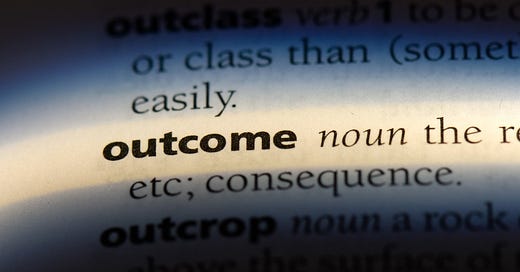Word Watch: Outcomes
"Outcomes" was absent from our vocabulary a few decades ago and is now thriving at the heart of it.
“A public school education…equips its pupils with a range of non-cognitive skills which allow them to capitalise on their privilege and advantage. A 2014 study by the Social Market Foundation identified these non-cognitive skills as confidence, communication and resilience. The report concluded that such trained skills were 33 times more important in determining employment outcomes between cohorts born in 1958 and 1970” - Robert Verkaik, Posh Boys, 2018.
So much of the modern world is compressed into a paragraph like this. The phrase “non-cognitive skills” is itself richly suggestive of our culture. Our use of the word “skills” to designate our accomplishments and, particularly, earning capacity is right up to date. “Non-cognitive” was used only in specialist contexts. We all know that it designates mental processes not connected with specific knowledge. I think.
But I want to focus (another modern word) on those “outcomes”. The singular “outcome” has always been a useful synonym, and alternative term, for ‘“result”. Like many words commonly used today it has developed a quite different, if related, sense as a plural.
“Employment outcomes” covers a sense more comprehensive than simply “results”, referring to a group of ideas relating to economics in general. The phrase often refers to the consequences of complex actions. “Environmental noise and light pollution contribute to a range of adverse health outcomes including heart disease and premature death” – House of Lords Science & Technology Committee report, July 2023.
“Results” would be an inadequate substitute for “outcomes” here. Perhaps “consequences” is more appropriate. But “outcomes” is the modish word for any idea on these lines. I draw your attention to it simply because it was absent from our vocabulary a few decades ago and is now thriving at the heart of it.
“Aspiring silks must already prove they have an in-depth understanding of equality, diversity and inclusion issues as well as evidence of actions you have taken to widen access and participation that have had tangible outcomes” - The Critic, 9 October 2024. “Outcomes” from “equality, diversity and inclusion issues” could hardly be closer to the meaningful centre of up-to-date thought. I hesitate to intrude in such profound matters – though on second thoughts perhaps they do require some none-too-reverent attention. Another time.






